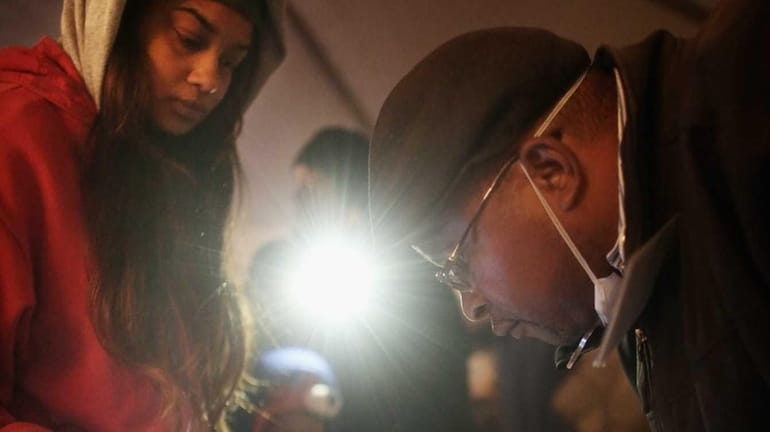O'Reilly: Has New York City embraced nonpartisan elections?

Rockaway resident Sheresa Walker, left, uses a flashlight as poll worker Lloyd Edwards assists before voting in a makeshift tent set up as a polling place at Scholars' Academy, PS 180, in the Rockaways. (Nov. 6, 2012) Credit: Getty Images
In 2002, newly elected Mayor Mike Bloomberg tried to bring nonpartisan municipal elections to city government. The effort failed, but 11 years later you might not know it.
Nonpartisan elections, which are used in about 80 percent of American cities, are supposed to take backroom politics out of the candidate selection process and open up campaigns to a freer flow of ideas. In removing party labels at the ballot box, voters are also supposedly encouraged to vote the candidate and not the party, which carries the baggage of national politics.
But though Mayor Bloomberg's nonpartisan ballot initiative faltered more than a decade ago, a remarkable thing is happening in today's city mayoral race: It feels wide open.
For one thing, there's no lack of candidates. If you put a gun to my head and demanded that I shout out the names of all the Democrats in the field, I couldn't do it. The race also has three Republicans and an independent -- a former Bronx borough president, not some political gadfly. All of the candidates bring something to the table.
But here's the thing: The party labels of the candidates feel almost irrelevant this year. The field is moving as a pack from forum to forum, giving each candidate an almost daily chance -- albeit a brief one, on crowded stages -- to score points against potential general election opponents.
It didn't use to be that way. Democrats used to debate Democrats during primaries, and Republicans debated Republicans. But just like with the Yankees and the Mets, interleague play has arrived in city politics.
Possible reasons why: After Rudy Giuliani and Bloomberg, voters have embraced the idea of an alternative to a party-machine Democrat, even if that means voting Republican. Candidates pretty much all share the same liberal views on social issues, and, for the past 12 years, we've had a mayor who is impossible to label. A Democrat-turned-Republican-turned-independent, Mayor Bloomberg personifies the postpartisan chief executive, and New Yorkers have, on balance, liked it.
Now, if only the free flow of ideas aspect of nonpartisan elections could flourish. Because right now, this pack of candidates is sounding an awful lot like a chorus. The city is listening; it's time for someone to belt out some solos.
William F. B. O'Reilly is a Republican political consultant.
